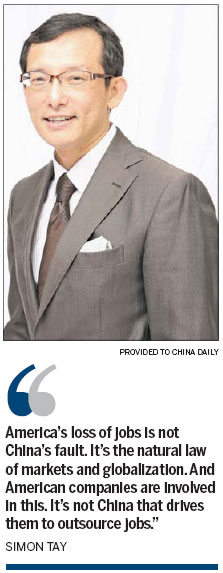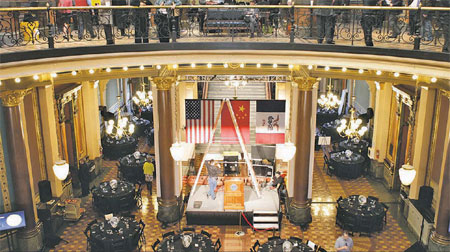Encouraging engagement
Updated: 2012-10-26 12:34
By Ariel Tung (China Daily)
|
||||||||
|
Workers prepare a dais inside Iowa's state Capitol ahead of a Feb 15 dinner for Vice-President Xi Jinping of China. Regular high-level visits are a sign of the global importance of US-China relations. Liu Zuoyi / China Daily |

China, Asia and the United States can all win in an interdependent world, Singaporean political analyst Simon Tay tells China Daily's Ariel Tung.
Into the vortex of opinion from Western policymakers, businesspeople and scholars that the United States is losing its competitive edge to China, Simon Tay has thrown an alternative view.
"The economic interdependence we see in the world is not about 'I win, you lose'. Both China and the US can win in an interdependent world," the Asian-affairs expert says.
The global financial crisis that began in 2008 accelerated the shift in power from one economic superpower to the other, according to Tay, who is chairman of the Singapore Institute of International Affairs, which researches and analyzes Asia-Pacific and international issues.
He argues that a new balance will need to be established in the United States' relationship with Asia. While America will continue to be a regional leader, Tay says, it should be more open to engaging Asia as a partner or suffer consequences if it tries to reassert its dominance.
"Asia's rise alone cannot guarantee stability in the region. I think it's good to have Asia and America engaged. But are they engaging us with the reassertion that it's still number one, or to look at us as a partner?"
"We, the ASEAN, hope that China and America will not have conflicts," he says, referring to the 10-member Association of Southeast Asian Nations. "Even if there is tension in US-China relations, we should do whatever we can to not take sides but to help both countries to see each other's point of view."
Speaking as a native of Singapore, Tay said the peninsular city-state of 5 million people "hopes to have the best of both worlds - America involved but at the same time welcoming Asia as a more mature continent."
But the rise of China, particularly since the crisis four years ago, has been perceived by many as a threat to the US. Asia overall has taken heat for the loss of jobs in the West. Getting tough on China has emerged as a major talking point in the 2012 US presidential campaign.
The American public also has expressed concern over China's increased economic might. In a recent Pew Research Center poll, 52 percent of respondents said the rise of China as a world power poses a major threat to the US.
"Republicans have accused President [Barack] Obama of being too soft on China," Tay says. "I think it's political."
In today's world, "it's China and, to some degree, India who are doing well. Singapore and its ASEAN partners, as well as Australia, are doing relatively well. These are the countries that buy and sell in China."
(ASEAN's nine other members are Brunei, Cambodia, Indonesia, Laos, Malaysia. Myanmar, the Philippines, Thailand and Vietnam.)
"When President Obama went to China, he asked China to buy Boeing aircraft. So logically, we should all hope China will continue to do well economically."
Although its economy isn't growing anywhere near as fast as China's current rate of 7.4 percent, the United States will remain ahead of both Asia and China, Tay maintains.
"The world has been living with America's power since the end of World War II. Whether you are in Asia or in America, the change you feel is quite significant.
"My view is that America is in relative decline. I think there are possibilities that America can regain some of its momentum. There are strengths of America that one can't overlook. Look at Apple. Its products are manufactured in China, but the design, branding concept and brand capture the greatest amount of value for the company. America has the world's most advanced educational institutions."

Tay disagrees with those who have predicted a hard economic landing for China, where gross domestic product has been growing at its slowest pace in over three years. While 2013 is likely to be challenging, even difficult, he believes China has the capital reserves and political will to avoid an economic crisis.
"China will probably achieve 6 percent growth by the end of [next] year, but that's not a hard landing.
"When Wall Street collapsed in 2008, there was a lack of demand from America. But Chinese leaders acted very decisively to prevent a downturn. China is now seeing the side effects of its stimulus package in the form of asset bubbles, inflation, bad loans, etc, but they prevented the economy from collapsing."
China will have to address those unintended outcomes, Tay says, but it's likely to do so, helping steady the economy.
Before the crisis, there had been broad recognition on both sides that the US-China relationship was important and, more importantly, mutually beneficial. But the weak recovery that has plagued the US since it officially exited recession in mid-2009 has sparked renewed rivalries - some real, some perceived - with China.
"We have a perception that our gain in Asia is at the expense of America," Tay says. "The talk about currency manipulation in China has gotten stronger. Only in the last few years have American companies like Apple been accused of adopting unfair practices."
With US GDP expanding at an anemic pace (1.3 percent in the second quarter, with new government data coming Friday) and unemployment hovering near 8 percent, Americans are concerned about jobs and their future. And outsourcing - particularly to China and other Asian countries - is seen as a culprit.
"Romney and others have been bashing China in order to win votes. One of the major issues is the talk about the loss of jobs, and that China is the reason American jobs are gone," Tay says.
"America's loss of jobs is not China's fault. It's the natural law of markets and globalization. And American companies are involved in this. It's not China that drives them to outsource jobs."
Frequently in the current campaign for the White House, both Obama and Republican rival Mitt Romney have attacked each other over the outsourcing of US jobs in manufacturing and other sectors to China.
During his re-election bid, Obama has said he would bring more jobs back by reforming the federal tax code to make outsourcing less financially attractive for US companies.
The United States' massive trade deficit with China - officially calculated at $295 billion in 2011 - has long been a cause of friction between the countries. But Tay believes the imbalance may be exaggerated based on "an old assumption in measuring trade flows", as he explained in his 2010 book Asia Alone: The Dangerous Post-Crisis Divide From America.
He quoted Victor Fung, co-founder of Li & Fung Ltd, a Hong Kong-based provider of trading, logistics and distribution services, as saying: "A lot of the stuff is actually produced in the initial parts of the supply chain which originate somewhere in Southeast Asia. The parts and materials may go through one or two countries, before they end up in a product that is finally assembled in China - but China gets charged for the full trade statistics."
In the past, the US was responsible for 60 percent of goods produced in Asia. Increasingly, products are being modified to suit Asian consumers, instead of their counterparts in Europe and North America. Tay doesn't think American consumption will bounce back to pre-crisis levels even if the US recovery gains steam.
"Consumer demand will increasingly come from not just China but Asia, as more than 1 billion people rise from poverty to a new middle-class level. Consumers in Asia will be buying cars and refrigerators and owning credit cards."
For that reason, China's 12th Five-Year Plan (2011-2015) includes the goal of shifting from an export-led economic model to one that relies on consumption.
In his third pre-election debate with Romney, Obama spoke of the trade case his administration brought against China in 2009 for subsidizing exports of tires. The president also said he has pursued more trade actions against the Asian power than his Republican predecessor George W Bush did during eight years in office.
In Asia Alone, Tay warns of the damaging consequences of what he calls US protectionism in efforts to curb imports from China and Asia. The book, mostly written in 2009 as he began his Bernard Schwartz fellowship at the Asia Society in New York, posits that US engagement with Asia can be a win-win.
Born and raised in Singapore, Tay has spent considerable time in the US as a student, teacher and visiting scholar. Elizabeth Economy, a political analyst at the Council on Foreign Relations, wrote in a review of Asia Alone that Tay has a "unique outsider/insider perspective on both the United States and Asia that few can replicate".
In another review, Asia Society executive vice-president Jamie Metzl called Tay's book "terrific" and said it "provides a penetrating analysis of the immense challenges facing the rapidly changing region and a thoughtful prescription for how Asians and Americans can best work together to realize the great potential promise of this Asia-Pacific century".
(China Daily 10/26/2012 page16)

 Relief reaches isolated village
Relief reaches isolated village
 Rainfall poses new threats to quake-hit region
Rainfall poses new threats to quake-hit region
 Funerals begin for Boston bombing victims
Funerals begin for Boston bombing victims
 Quake takeaway from China's Air Force
Quake takeaway from China's Air Force
 Obama celebrates young inventors at science fair
Obama celebrates young inventors at science fair
 Earth Day marked around the world
Earth Day marked around the world
 Volunteer team helping students find sense of normalcy
Volunteer team helping students find sense of normalcy
 Ethnic groups quick to join rescue efforts
Ethnic groups quick to join rescue efforts
Most Viewed
Editor's Picks

|

|

|

|

|

|
Today's Top News
Health new priority for quake zone
Xi meets US top military officer
Japan's boats driven out of Diaoyu
China mulls online shopping legislation
Bird flu death toll rises to 22
Putin appoints new ambassador to China
Japanese ships blocked from Diaoyu Islands
Inspired by Guan, more Chinese pick up golf
US Weekly

|

|







